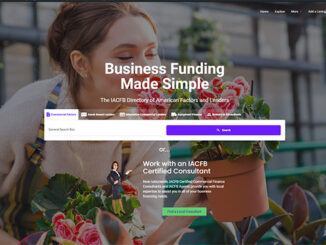
From the standpoint of business development, it is obviously important that factoring brokers understand what characteristics are common to desirable factoring clients and to be aware of these characteristics when marketing and prospecting. It is well known that factor’s are specialists at dealing with adversity and their creativity in developing a financing solution to almost any problem is legendary. As a broker, however, your income will be very much tied to the number of standard “middle of the road” plain vanilla clients you can develop.
In today’s marketplace, good prospects for factoring can come from almost any sector or industry. While the circumstances that trigger the need for a factoring arrangement can vary considerably, the common thread is always a need to speed up the payment from invoiced sales so the cash can be used for some immediate purpose. Such needs can include:
- making timely payroll
- purchasing inventory
- paying suppliers for parts or merchandise early to obtain volume discounts
- paying overdue tax obligations
- purchasing machinery, vehicles, and equipment
- funding retirement programs or investment accounts
- providing funds for acquisitions
- expanding sales and marketing operations
- buying out partners
Although there can be many uses for the funds acquired through utilizing factoring and speeding up cash flow, without question the number one reason for factoring will be to take the worry out of making timely payroll.
Some General Characteristics of Acceptable Factoring Clients
Features of good and acceptable factoring clients include:
- INVOICED SALES: True factoring is never a loan (although some factoring structures may appear so). Factoring involves the early purchase of invoices prior to their normal terms granted to the customer for payment. Factoring must always involve invoices for goods delivered or services performed.
- VERIFIABLE AMOUNTS DUE: Factors purchase a piece of paper (an invoice) that evidences the obligation of one company to pay another for work performed or goods sold and delivered. Such invoices must be verifiable, or in other words, if the factor calls the customer that owes the invoice balance, that customer will verify that the amount represented as owed on the invoice is correct and valid.
- UNENCUMBERED INVOICES: Invoices purchased by a factor must be unencumbered. This means that the client cannot have a pre-existing loan from a bank or other lender that uses the
 invoices (accounts) as collateral. If such a pre-existing loan exists, the lender will be required to “subordinate” the accounts so that the factor can obtain a senior security position in those accounts. An alternative is, of course, that a portion of the advance made from factoring is used to completely pay off the bank loan and eliminate the bank’s security position entirely.
invoices (accounts) as collateral. If such a pre-existing loan exists, the lender will be required to “subordinate” the accounts so that the factor can obtain a senior security position in those accounts. An alternative is, of course, that a portion of the advance made from factoring is used to completely pay off the bank loan and eliminate the bank’s security position entirely. - BUSINESS / PAYROLL TAXES: Prospective clients must also have their taxes current or the IRS or state taxing authority owed the tax, must be willing to subordinate their senior line position. The factor must always be in a senior security position on accounts.
- CONTINUING NEED / ONGOING BASIS: Prospective clients should exhibit a need for factoring on an ongoing basis. Factoring facilities are created to finance companies with the purchase of invoices weekly or in some cases, daily. Clients that only need additional working capital on a very occasional or one time basis (spot factoring), will find it much more difficult to interest a factor in accepting the account. Should the factor accept such an account, the factoring fees charged are usually quite high.
- PROFIT MARGINS: Factors will look at the profit margins of the prospective client to make certain that enough profit exists to absorb the costs of factoring. Companies with 15% profit margins or higher can easily absorb the fees of a factor. Companies with less may not be able to.
- SMALL BUSINESS SELLING to LARGE RETAILER or SERVICE PROVIDER: One of the most typical characteristics of a business that will require factoring and asset-based finance is one that is relatively small and in the early stages of its existence but which is selling to large retailers or service providers. Such large customers almost always demand liberal terms of payment such as 45-60 days which can cause severe working capital shortages for smaller, early stage companies.
- BUSINESSES SELLING TO LOCAL, MUNICIPAL, OR STATE GOVERNMENTS: Governmental entities are notoriously slow payers. Many minority and disadvantaged enterprises have relatively easy access to lucrative contracts from such entities, however, and can launch themselves into a successful venture if financing is available. Focus list building efforts heavily to those on “approved vendor lists” at the city, county, or state government level.
- SERVICE SECTOR BUSINESSES: Service sector businesses tend to have a built in problem when it comes to financing. Most service companies have little or no hard collateral to pledge to a traditional bank making lending nearly impossible to secure. Always be on the lookout for companies such as temporary staffing, commercial janitorial service providers, guard service companies, commercial lawn care and landscaping businesses, general commercial maintenance companies, etc. in your earliest networking efforts. These accounts can also grow rapidly if provided with financing, increasing your commission income as they grow.
List Building: Where to Start
If you are creating direct marketing campaigns and are going to be using a mailer with a follow up phone call, you will need to construct LISTS (see page 153-155 in your Factoring 101 Broker’s Guide). To some extent, quality list building is an art, but it has become much easier due to the growth of the internet. In fact, you can easily construct a list of 100-200 quality recipients in the morning and have the mail batch out in the afternoon.
When first starting out, you will want to create small lists of about 100 or so business owners….no more than you can follow up on within a week. A great sector to focus on for your first lists is services. To build a quick list of service providers, simply use any search engine to gather data. For example, run a search on “Janitorial Services in Tampa”. This will display dozens of janitorial companies for your first mailing. Do multiple searches until you have 120 businesses for you first mailing. Once you have the raw material, you will want to…
- Search the Business Name in the business search area located in the Secretary of State’s website where the business operates. Owners (shareholders) are typically displayed here so you can add a recipient’s name to your mailing rather than just addressing it to the business.
- Search the Business Name in UCC search area in the Secretary of State’s website. This will tell you if the business is already being financed and, in some cases, by who. Companies with no UCC filings will be your best prospects but those with filings evident can also be very high quality leads. For example, the company may be utilizing an expensive ACH advance for financing when much less expensive factoring could do the job more affordably.
- View the company’s website if possible. The quality of a company’s website can often give you valuable information about the size of the prospect.
Best Prospects for Lists: Small Client / Large Customers
The most productive formula when it comes to list building is to find smaller companies that will tend to be servicing larger customers. This is because almost all larger companies demand 30 day or longer terms of payment. Smaller service providers usually do not have the working capital to easily provide the 30 day or longer terms to such customers and the more large customers they acquire, the more pressure is put on working capital balances. To continue growing, they will need to find a method of financing their terms of payment and that method is most often, factoring. When building your lists, always look for smaller companies in high growth industries that are likely to servicing larger customers.
Start Your Own Factoring Consultant Business
Becoming a home-based factoring consultant and beginning to earn a share of the factoring industry’s near legendary residual commission income is easy with the training and marketing support products provided by the International Association of Commercial Finance Brokers. Learn more by visiting IACFB today!




